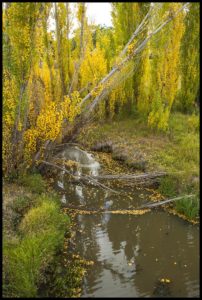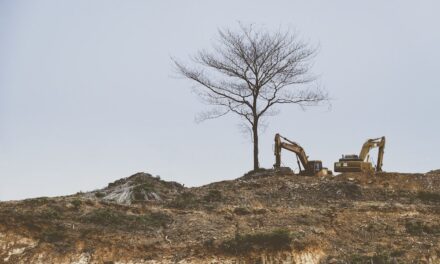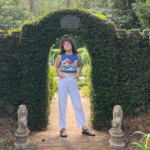Editorial Assistant Taylor Byas: Nancy Chen Long’s poem “Reverberation” (Issue 16.2) fights back against silence and erasure. The poem’s title points toward the resonance of sound, and this is exactly what Chen Long’s words do: even in stillness the music of her language ripples across the page.

“Tenterfield Creek and Poplar-1=” by Sheba_Also 15+Million Views is licensed under CC BY-SA 2.0
In the poem’s first half, Chen Long’s speaker watches a poplar tree fall. To directly contrast the encapsulating silence of the speaker’s “noise-canceling headphones,” Chen Long produces bursts of sonic fireworks by playing with alliteration, consonance, and assonance. This section rings with repeating sounds within phrases like “to see a yellow poplar topple” and lines such as “flitting toward the lower branch of a weeping willow / to the only one of five feeders that remains.” Even in the headphones’ silence, the speaker knows that “the eight-story poplar crashes.” Here Chen Long constructs a soundscape that rebels and refuses to be ignored.
The second half of the poem gestures outward and asks the reader to consider how evidence, history, and memory are intertwined. When the speaker’s husband cuts into the fallen tree, “He points to the tree’s rings, / as if memories had been written on each circle.” The speaker thinks of the information that is “missing // from our history books,” such as the 1921 bombing of a black neighborhood in Tulsa and how many Jews were lost during the Holocaust. The line and stanza break between “missing” and “from our history books” accentuates this absence of information. In both instances, the presence or absence of written evidence seems to be directly connected to history and memory making.
Perhaps the most important move of the poem is Chen Long’s transformation of the oft-considered question, “If a tree falls, yet no one hears it, / did it make a sound?” Appearing first as a question posed by the speaker’s grade-school teacher, the question is then recast within the poem’s context. Chen Long’s speaker asks, “If six million people were killed in a genocide, / if people were bombed by citizens of their own country, / yet no one remembers, did it happen?” Using the old riddle as the framework for the poem, Chen Long highlights the precarious balance between sound and silence, remembering and forgetting, what is true and what isn’t.
So, what is true? What is real? Chen Long’s speaker recalls the grade-school teacher saying “There is no such thing / as sound. It’s only compressed air.” However, the poem’s last line, “I hear my mother singing, even though she’s not here,” directly negates the teacher’s lesson and complicates the reader’s understanding of sound and memory.
Ultimately, Chen Long’s “Reverberation” endeavors to answer the riddle. If no one hears the tree fall, does it make a sound? Maybe. But Chen Long argues that the only proof we have of it, and of anything else, is language, what has been written. Words fill the silence of the headphones, provide the missing pieces of history, and produce the voice of the mother’s speaker even in her absence.
Taylor Byas is a fun-size Chicago native. She is currently a PhD student and Yates Fellow at the University of Cincinnati. Her poems appear or are forthcoming in New Ohio Review, The Journal, storySouth, Borderlands Texas Poetry Review, and others.











